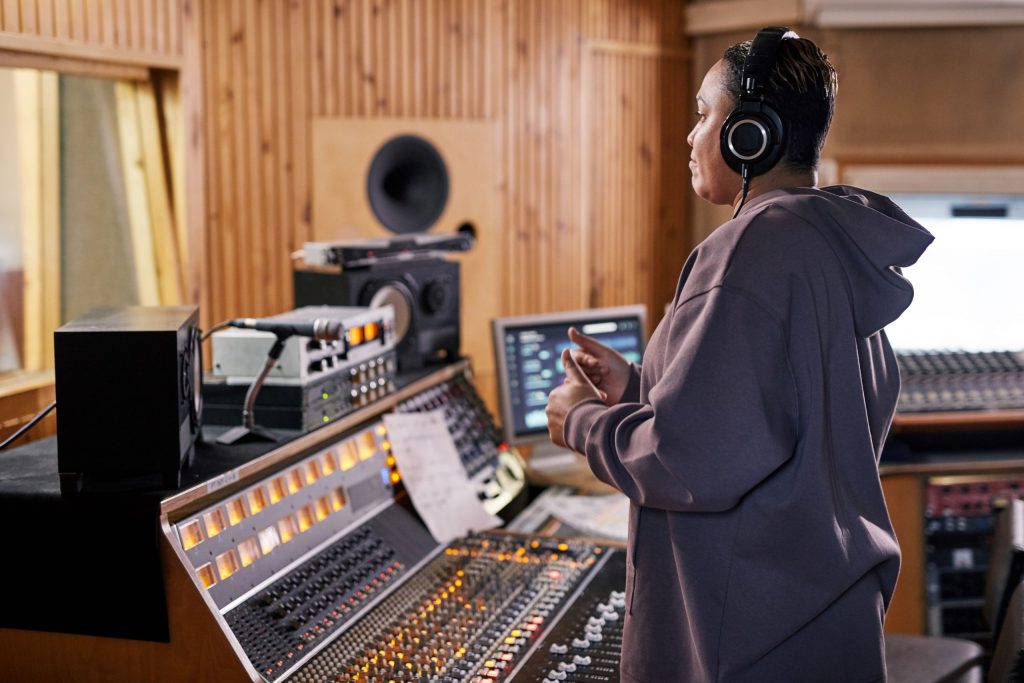
The unseen thread running across the fabric of movies is music; it turns ordinary images into gripping stories. The soundtrack of a movie develops emotions, establishes the tone, and even defines genres from the first titles running to the last moving sounds. Often without a single word uttered, a great music may arouse a range of emotions—from happiness and victory to dread and sadness. Scenes that leave a lasting impression on us long after the titles have disappeared are those in which picture and sound work harmonically.
Examining well-known compositions that have crossed their movies to become cultural icons would help one to understand how amazing movie soundtracks have revolutionized the movie-going experience. From opulent orchestration to muted tunes, we will explore the genius behind these amazing works and their great influence on listeners all over. Come note with us how constantly music influences movies.
The Role of Music in Enhancing Emotions
The music in movies greatly influences the emotions we go through. In love stories, our hearts may fly; in thrillers, they may heighten the suspense and send us straight onto the edge of our seats. Consider the famous theme from “Jaws”—the basic yet eerie two-note pattern immediately generates suspense and makes us want something terrible. Likewise, the broad melodies of “Titanic” catch the intense feelings of love and grief, thereby guiding us through every minute of the character trip.
Beautiful in that they let us relate to the characters on screen are movie soundtracks. The music swells at a turning moment increase our emotional level and helps us to identify with the challenges and accomplishments of the characters. Listening to these amazing soundtracks helps us to remember the events that surrounded and to experience those feelings outside of the theater. Whether the film is a romantic drama or a heart-stopping thriller, a good music enhances the whole watching experience.

Defining Characters and Themes Through Soundtracks
Music in movies brings people to life and tells the plot, thereby beyond simple filling of silence. Among the best depictions of this is Darth Vader’s “Imperial March from Star Wars.” This great and amazing song not only shows Vader’s presence but also catches his dark and aggressive attitude. Each time we hear those well-known notes, we rapidly see the villain and the tension he generates into the story. It’s incredible how strongly an emotional connection a single piece of music can establish to a character.
Comparably, music might provide minute hints about the path of a character. For instance, a character beginning with a lively and happy tune can change to a more mournful melody in face of difficulties. This musical shift not only emphasizes their emotional condition but also clarifies for the viewers their development throughout the movie. This approach helps the characters to be more accessible and memorable by using music, therefore illustrating how well a good soundtrack may improve the narrative experience. All things considered, music improves the narrative and deepens our relationship to the characters, thereby making their trips much more important.
Building Tension and Atmosphere
Scenes are very remembered as movie soundtracks masterly build tension, mystery, and thrill. Consider Alfred Hitchcock’s “Psycho,” whose dark threads cause discomfort long after the movie closes. The sharp, staccato notes cutting the pictures cause viewers seated close by to tense. In Christopher Nolan’s “Inception,” too, the explosive layer of tension is provided by the booming basslines. The soundtrack heightens the suspense and draws the viewers more into the action as the story shifts across dream realms.
Setting the tone in pivotal situations depends on the environment these soundtracks create. Whether it’s a crescendo alerting us to a climax or an unsettling calm building expectation, music often silently but powerfully guides our emotions. This link between sound and images improves our experience and helps us to feel what the characters do and to fully engage in the narrative. When the soundtrack of a movie exactly matches its images, it guarantees a flawless emotional rollercoaster that guarantees we not only see but also actual experience of the movie.
Cultural Impact of Iconic Film Scores
Usually as memorable as the films themselves, movie soundtrack have a particular tendency to linger with us. John Williams’s “Hedwig’s Theme” from Harry Potter is a beautiful tune catching the magic and wonder of the wizarding realm. Every time we hear those sounds, they reminds us of the magic in the story and carries us to Hogwarts. Likewise, Hans Zimmer’s The Lion King soundtrack brilliantly mimics African sounds, therefore transforming animated lions into individuals we could identify with and care about. These ratings improve the movies as well as appeal to viewers all around, thereby fostering a common cultural experience.
It’s amazing how these musical motifs could make their way into our daily life outside the screen. They abound in ads, concerts, and even on our own playlists. Our own stories include the pleasing tunes as they might awaken memories and emotions. From the beautiful strings of Cinema Paradiso to the broad orchestration of The Big Country, these songs show just how powerful music can be in shaping our attitude to movies and the feelings it generate. Great cinema music leaves long-lasting impressions on us long after the credits have rolled, well beyond simple accompaniment of pictures.
Technology’s Influence on Modern Film Scores
Artificial intelligence and digital technologies have opened fresh creative and experimental opportunities and drastically changed the way we make movies’ soundtrack. Consider “Tron: Legacy,” whose orchestral parts deftly and immersively blend electronic sounds. The possibilities appear nearly endless with technology allowing producers blend sounds, modify instruments, and even create musical concepts using artificial intelligence. This tech-savvy technique not only sharpens the intricacy of soundtracks but also lets creators investigate unusual audio textures they would not have otherwise thought of.
Furthermore, integrating artificial intelligence into music creation enhances the standards for cooperation and creativity. Thanks to digital technologies, composers may now rapidly test many styles and configurations and get immediate comments. This allows them to spend more time developing their creative vision than they would be worried about technical composition issues allowing. We could expect ever more dynamic soundtracks conveying the fundamental plot of a movie to engage viewers in innovative and captivating soundscapes as technology progresses. In terms of movie music, this is a fascinating time when lines separating traditional and creative methods blur to provide distinctive and mesmerizing sound experiences!

Final Thought
Since they function as an emotional compass directing the audience’s emotions and responses all through the plot, film soundtracks are very important in determining narrative structure. Composers raise tension, stress, and emotional depth by precisely altering melody, harmony, and rhythm, thereby highlighting character moments and emotional depth that will last long after the credits have rolled. Apart from setting tone and mood, the music gently penetrates the movie’s fabric to strengthen the audience’s connection to the story. As you enjoy your chosen films, focus especially on the music; this sort of workmanship improves immersion and increases the full impact of the cinematic journey.

